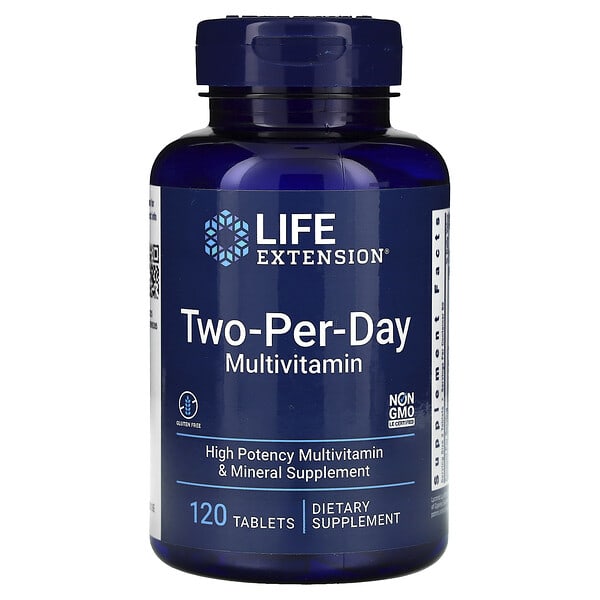Key Features
- High-potency multivitamin with advanced bioavailable forms
- Includes patented ingredients: Lycored LycoBeads®, SelenoExcell®, L-OptiZinc®, Crominex® 3+
- Broad spectrum formula with antioxidant and mitochondrial support
Unique Features
- Premium ingredients at an accessible price
- Backed by clinical research and third-party patented compounds
- Well-balanced formulation with smart omissions (e.g., calcium, K)
Pros
- Optimal dosages for daily support
- Enhanced absorption forms of vitamins and minerals
- Focus on science-backed ingredients
Cons
- Low potassium content
- No calcium or K included — may require separate supplementation
- Some ingredients like Apigenin or Magnesium have low bioavailability
Summary
Unique Ingredient Highlights
The Two-Per-Day multivitamin features a range of ingredients with proven effectiveness, some of which are delivered in highly bioavailable forms. Notably, the product includes four registered trademarks that contribute to its superior bioavailability:
1. Lycored LycoBeads® (for enhanced antioxidant support)
2. SelenoExcell® (a patented form of selenium for better absorption)
3. L-OptiZinc® (a highly bioavailable zinc source)
4. Crominex® 3+, Capros®, and PrimaVie® (providing comprehensive antioxidant and metabolic support)
These ingredients are designed to enhance the absorption and effectiveness of the nutrients in the multivitamin. The presence of these patented compounds sets the product apart from other multivitamins, making it a valuable option for consumers who prioritize bioavailability.
As well as providing superior absorption, they also signal the brand's investment in quality sourcing over cheaper alternatives.
Special Plant Compounds
Two-Per-Day contains plant-derived flavonoids and polyphenols such as quercetin and apigenin. These compounds contribute additional antioxidant, anti-inflammatory, and cellular health benefits.
- Quercetin is included in a bioenhanced form (though not the highest available).
- Apigenin, while present, has relatively poor oral bioavailability — a known issue with this flavonoid. Nonetheless, it is a promising neuroprotective and calming compound that adds functional value to the formula.
Possible Limitations and Considerations
While Two-Per-Day offers many benefits, there are some aspects that consumers should keep in mind:
- Absence of calcium: Unlike some other multivitamins, Two-Per-Day does not include calcium. For some users, this may seem like a downside. However, this omission is likely intentional. In adults, excess calcium supplementation — especially in poorly absorbed forms — has been associated with vascular calcification and other health concerns. For this reason, many experts recommend getting calcium through diet rather than supplements unless prescribed by a healthcare provider. In this context, the absence of calcium in the formula can be viewed as a neutral or even thoughtful choice.
- Low doses of potassium and other minerals: Potassium plays a key role in muscle function, nerve signaling, and fluid balance, but the dosage in Two-Per-Day is minimal. This is common among multivitamins, as higher doses of potassium require careful regulation. Those with specific needs may require separate potassium supplementation or dietary adjustments.
- Low bioavailability of some ingredients: As previously noted, ingredients like apigenin — while promising — have relatively low oral bioavailability. Additionally, the form of magnesium used may be less effective compared to more advanced forms like bisglycinate or malate. Still, their presence in the formula adds value, particularly when combined with other more bioavailable compounds.
Bioavailability Considerations
Bioavailability and Overall Value
The overall bioavailability of Two-Per-Day is significantly enhanced by the inclusion of the aforementioned patented ingredients. These compounds ensure that the vitamins and minerals in the product are not only present in adequate amounts but also absorbed effectively by the body. Despite a few shortcomings, such as the less effective magnesium form and the absence of vitamin K, the product delivers a solid range of nutrients that can support various health needs.
When compared to other multivitamins on the market, especially those available at similar price points, Life Extension’s Two-Per-Day offers premium ingredients that elevate its value. The use of high-quality forms of zinc, selenium, and antioxidants makes it a worthwhile investment for those seeking a multivitamin with enhanced absorption.
Side Effects and Warnings
Public Perception and Consistency
User Reviews and Effectiveness
Life Extension Two-Per-Day for Women Over 50
- Suitability: The Life Extension Two-Per-Day multivitamin is likely suitable for women over 50, offering high-potency nutrients for general health, but it lacks calcium, critical for bone health.
- Key Benefits: Supports energy, cognitive function, and eye health with high doses of B vitamins, lutein, and zeaxanthin.
- Considerations: Women need to ensure adequate calcium intake from other sources; high doses may interact with medications.
Why It’s Suitable
The Life Extension Two-Per-Day multivitamin provides a broad spectrum of vitamins and minerals in high-potency, bioavailable forms, which can support the health needs of women over 50, such as energy metabolism and eye health. Its formulation includes nutrients like vitamin D and selenium, which are vital for aging populations.
Key Considerations
The absence of calcium means women must obtain it through diet or additional supplements, as bone health is a priority post-menopause. High doses of certain nutrients may pose risks for those on medications, requiring medical consultation.
Similar Multivitamins
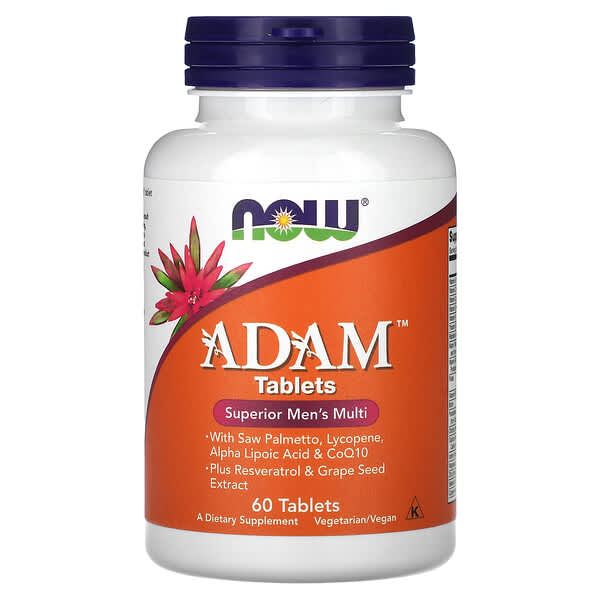
NOW Foods, ADAM, Superior Men's Multi, 60 Tablets
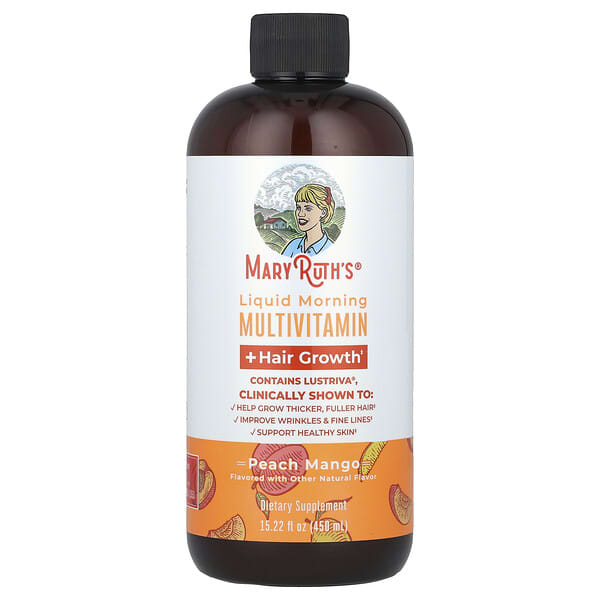
MaryRuth's, Liquid Morning Multivitamin + Hair Growth, Peach Mango, 15.22 fl oz (450 ml)
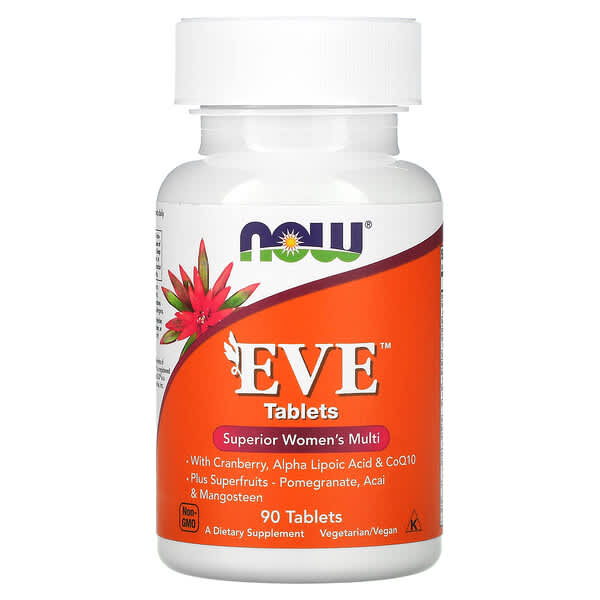
NOW Foods, Eve, Superior Women's Multi, 90 Tablets
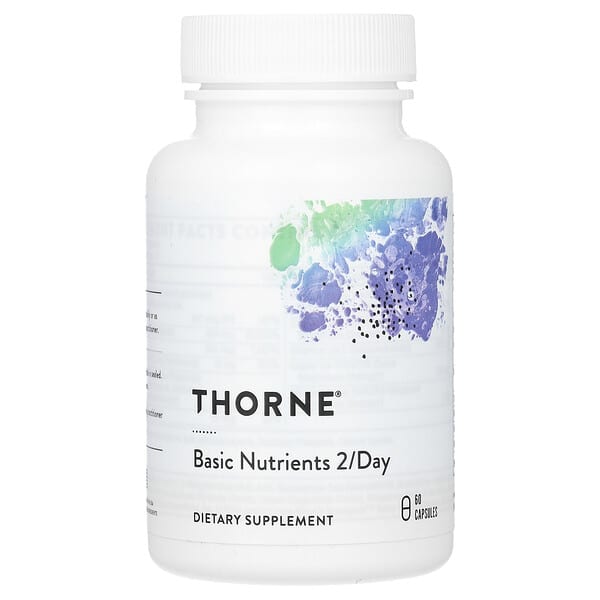
Thorne, Basic Nutrients 2/Day, 60 Capsules
Unique FAQs
Is Life Extension Two-Per-Day safe for women over 50?
Why does Two-Per-Day use multiple forms of certain vitamins, like riboflavin and vitamin B6?
What’s the benefit of including SelenoExcell and Se-methyl-L-selenocysteine in the selenium blend?
How do apigenin and lycopene in Two-Per-Day enhance its overall benefits?
Is Two-Per-Day suitable for vegetarians or vegans?
How does the potency of vitamins in Two-Per-Day compare to the Recommended Daily Allowance (RDA)?
Sources
Disclaimer
The information provided on this website is for informational purposes only and is not intended as medical advice, diagnosis, or treatment. Always consult with a healthcare professional for any health-related questions or concerns.
